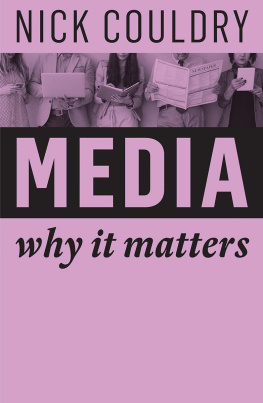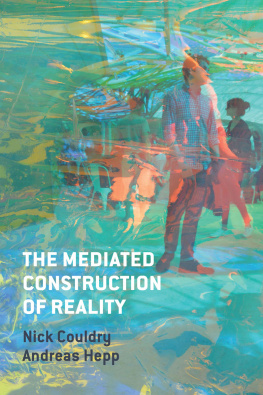Introduction
Looking into the Mirror
Nick Couldry began his academic career by reading classics and philosophy at Oxford. Then he became a lawyer. And now he is Professor of Media, Communications and Social Theory at the London School of Economics. Along the way he has written about a very wide range of subjects, including ethics, globalization, democracy, technology, public engagement, agency, rituals and many more.
How is it possible that one career trajectory can touch on all these diverse areas?
Well, when you look closely, it turns out that theres a clear arc that links them all together. In fact, as Nick amply demonstrated throughout our discussion, it could be argued that a proper understanding of media, communications and social theory might just require an equal measure of historical appreciation, philosophical dexterity and legal and ethical awareness.
Its important to appreciate where we come from and what weve done. But its equally important to understand what, precisely, weve been doing along the way, and what were continuing to do. In other words, it is essential to get a sense of who we are in the first place.
But why look at media at all?
I have no particular interest in media texts. Im not a film buff particularlynot in a way thats relevant to the work I do. Im not obsessed with television soap operas. I dont love radio or newspapers to the exclusion of everything else. What I am interested in is the idea that we can represent the social through texts and forms that carry a certain weightso they almost become the social for us. And that trick, if you like, strikes me as very, very interesting, because it naturally draws you into anthropology, sociology and other areaseffectively, the theory of how societies work at all.
The core question of all my work is, How do we do social ontology? How do we think about the things that are the social, in a society where they have to pass through a process called mediation, which is an abstract way of talking about all the things we call media?
For Nick, then, media serves the role of a clinical filter, if you willa way of putting society under a microscope to get the clearest possible sense of what our values are, how we act and why. Rather than an end in itself, we might regard it as an extremely useful tool to examine power structures, political movements, economic interests, democracy and our evolving notion of culture. It is, in fact, one of our principal windows on that thing we call society.
I became captivated by this phenomenon that we call the mediation of society. What difference does it make to the thing we think we know as society, or government or any of the big abstractions we talk about in the social sciences, when our starting point has to be that these processes work through very complex institutions of mediationwhich have their own interests and involve very strong power playswhat difference does it make to something like a society that it is mediated now?
And then theres this key point: one essential, yet invariably broadly overlooked way in which a mediated society subtly differs from a theoretically envisioned non-mediated one, is by, of course, the very unquestioned existence of media institutions themselves.
As I started to think about what my angle for thinking about media institutions would benot the text, but the institutions that we call the media, if you likeI realized that this was something much less certain and much less studied: How was the legitimacy of media institutions itself sustained?
Until recently, the assumption was that you certainly had a TV and watched a lot of it. You had radio, you read newspapers and so on. And you were broadly oriented towards whatever was on the media wall.
I never really started from that assumption, because I was always intrigued by the possibility that you might turn your back to the wall. You might swivel round and pay no interest to the media whatsoever.
It turns out that media institutions actually have to work very hard to produce the situation where they are the automatic port of call when we want to find out whats going on, as we say, whats real in society.
It was this that made me realize that one could use anthropology and sociology to understand those hidden processes, which the media never wants to talk about, precisely because it wants them to be taken for granted.
And suddenly the mysterious links that run through Nick Couldrys career become considerably more transparent.
If one is driven to develop a legitimately deeper grasp of the workings of societywhat it has been, what it now is and what it might bethen what better way to move forwards than by paying very close attention not only to what it consumes and how, but how it regularly values those particular institutions and organizations of consumptionhow, precisely, they shape our economic, political, cultural and social interests?
Looked at in this light, then, it is not terribly surprising that Nick Couldry wrote an entire book on Neoliberalism and its effect on the diminishment of Voice. Again, at first glance, this might seem somewhat incongruous: what is a professor of media studies doing commenting on a particular political movement?
But for Nick, its all of a piece. From his vantage point, what the neoliberals were most guilty of wasnt a set of particular policies and their implementation, but rather their broader meta-policies: the deliberate diminishment of contrary views and opinions that are the lifeblood of any robust, democratic society.
And far worse still, they often achieved these ends in active collusion with the very media institutions that are naively imagined to be singularly devoted to upholding that very principle in the first place.










